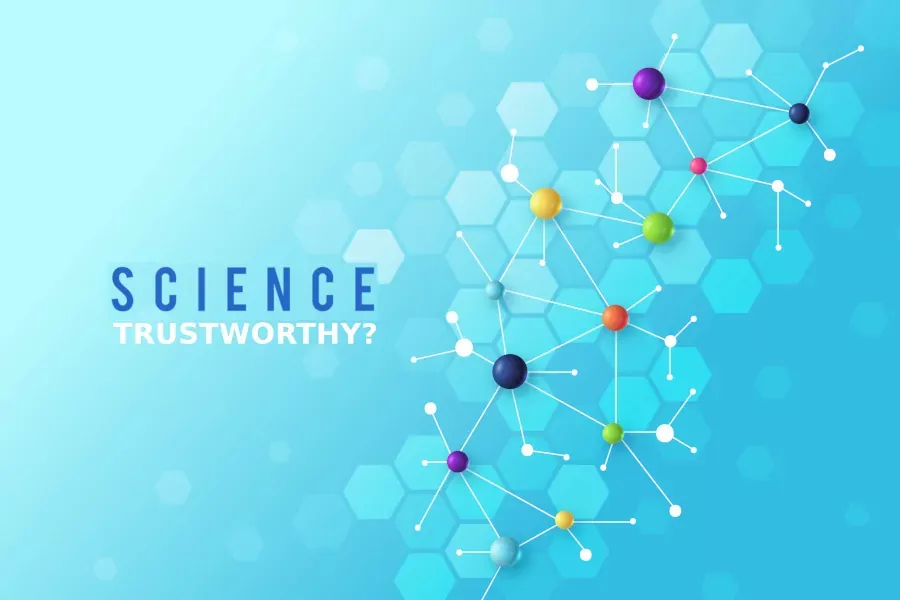Can We Still Trust Science and Research?
This website depends heavily on research results and statistics to add value to content. Incorporating scientific information provides a depth of knowledge that goes beyond anecdotal reporting. But can we still trust science and research? The answer is yes, if you know how to look at information.

Events over the past number of years shook our confidence and trust in science and authority. More than once, science was propagandised and weaponised.
We have seen this kind of manipulation in industries before – medical, pharmaceutical, clinical, health, wellness, food – and the list goes on.
...science given a bad name
Most things pale by comparison to what transpired in recent years. Vast amounts of profit were made on the heels of bad 'science' and from global hardship.
Even today, populations remain deeply divided and the rifts caused within families and societies may never heal.
Taking a Step Back
Science is a value free, neutral course of inquiry. It's an intellectual process of systematic observations aimed at making sense of the physical world. It is also an organised, structured body of knowledge in a field.
Research offers valuable snapshots at a specific point in time. And science and research are vehicles to this end. They can be driven by either a responsible, skilled driver or a reckless maniac.
Whom or what science is put in service of will determine its value.
...assigning blame correctly
Science is not the problem. The unethical and immoral agendas that drive 'science' are. Science and research are as worthy as they ever were.
They offer ways to make sense of a complex world. They expand our knowledge into all areas of existence and provide answers.
Science greatly improves our lives with life-saving and everyday technologies that we depend on. We can most certainly still trust science and research, we just need to look at information differently.
The Problem
The majority of stakeholders in a field are honest, scrupulous and ethical, but there are those who are not. And they are the crux of the problem.
Corrupt stakeholders place science and research in service of their own agendas. They influence and control research results. And they have the motives to want to do so.
...results shaped by funding
Stakeholders and major players often provide research opportunities and, more importantly, funding. If they are corrupt, they have the power to ‘buy’ researchers to attain any result they want.
Industry funded research is four to eight times more likely to be favourable to the interests of funders 1. This is known as funding bias or the 'funding effect' 2.
Plus, sponsored research is more likely to carry more weight and be more impactful in an industry.
...tortured data
No industry is likely to fund research that will put them in a bad light or cause loss of business. Funding very often comes with an expectation that will shape the outcome before the study has even begun.
Corrupt funders are not interested in what the data is saying – they are only interested to make the data say what they want it to say. This can involve downplay, omission, cherry picking or outright fabrication.

The Solution
All we need is a fresh angle – to look at information more critically. We need to be mindful of who research sponsors, funders and stakeholders are. It is usually not difficult to find this information.
Nowadays, reputable journals require researchers to declare any conflict of interest and to state who the funders and sponsors are. Simply by looking at who commissioned research can be very telling.
...look for motives
Instead of just focusing on what the research is saying, also look at what it is not saying.
Consider what a large dry cat food conglomerate might gain if they commissioned a study that discredits all other methods of feeding.
Think of what their motives could possibly be and what value the research results would hold for the stakeholders and funders.
...look for agendas
Looking for who and what agenda may be behind a study is a good habit. Corrupted research or cherry picked data can be plied to fit any agenda.
Many of us will see research results online or in an online discussion. We have to keep an eye open for corrupt research and tortured or forced results.
Consider who the web author is, what their website is about and what it stands for. What message does their website convey? Who are their sponsors, what products do they sell or promote?
Which adverts appear on their website? Might there be a hidden agenda their research results discussion might be pushing or trying to achieve?
...consider the purpose
Does the study or discussion simply want to put forth good information to expand our knowledge on a subject? Or could the information be used in service of some kind of agenda or product?
Take an example. Say a new study of a species appropriate feline diet surfaces and offers data that strongly oppose this way of feeding. Again, if the funder is a pet food conglomerate, be suspicious.
...try to make sense of findings
Try to make sense of why findings might be overly negative (or positive). Are they raising valid points? Or are they reviving old agendas? Is it fear mongering aimed to discredit? Is it propaganda dressed up as research?
Are they opposed to a species appropriate diet for legitimate reasons that you should take note of? Are they trying to help you avoid making some mistake? Was the study commissioned possibly for the sake of interest or knowledge promotion?
Or does it feel like a ploy to smear and misrepresent? Could the results be earnest or could they merely be used to bolster sales or disqualify competitors? Are they lures to make you more pliable to their products or motives?
...consensus is not always a good truth indicator
Agreement on a point can most certainly lend it credibility. However, dishonest research can also gain great momentum. They can build on dishonesty with more dishonesty to strengthen their voice.

At worst, others might be coerced into agreeing with them or face the music. And they may discredit and attempt to silence those who differ from them.
Sometimes, unsuspecting parties simply pick up bogus research results and inadvertently give traction to them.
...beware the expert bias
We have an inclination to accept – without question – that experts and authority figures are truthful and trustworthy. But the past number of years showed that they too can be dishonest and deceitful.
Mainstream media is one example of how previously trusted institutions were corrupted to get behind fake news, damaging propaganda, scare tactics and lies – as if they were true.
...the truth can only be suppressed for so long
Fortunately, for every dishonest voice, there is the dissonant voice that consistently tells the truth, come what may. Luckily, liars are outnumbered by truth seekers.
Plus, ethical researchers and scientists far outnumber dishonest ones.
...truth crusaders
Most scientists and researchers are incorruptible. They refuse to compromise the truth, even in the face of dire consequences. The truth is steadfast because they are.
They would rather put their careers on the line than their integrity. And we have to applaud them because they put the truth above all else – no matter what the cost to them.
...lies made us sharper
At least one good thing transpired. The lies and deceit made us smarter and less fleeceable. Most of us are less accepting of information just because it comes from a supposedly trustworthy source.
And maybe this is a good thing because it has made us wiser and more discerning consumers of information.


References
1 Katch, V. (2016). Industry funding: Pros and cons. In Michigan Today, University of Michigan. Retrieved on April 11, 2023, from https://michigantoday.umich.edu/2016/01/18/industry-funding-pros-cons/
2 Perković Paloš, A. & Konstantinovic, I. (2023). Funding (sponsorhsip) bias. In The Embassy of Good Science. Retrieved on April 11, 2023, from https://embassy.science/wiki/Theme: B962d39b-ee34-4562-951c-5193700beff6
Disclaimer
The information provided on the Bestfedcats.com website is educational and informational. We are here to give guidance on how to feed a properly balanced raw diet. We also offer advice on how to improve the diet of the modern house cat. Please note that we are not veterinarians. We are not here to give veterinary advice. Best Fed Cats will not be held responsible for any adverse reactions to your cat based on the information on our website. The health of your cat depends entirely on you. We expect you to use your knowledge of your cats, their circumstances and their health – in conjunction with a trusted veterinarian – to determine if any advice provided on this site is appropriate for your cats.

